AANHPI Mental Wellness
Suicide Prevention Month

Asian American delegates from Colorado attend Democratic National Convention CACEN raises funds for community center
















Asian American delegates from Colorado attend Democratic National Convention CACEN raises funds for community center














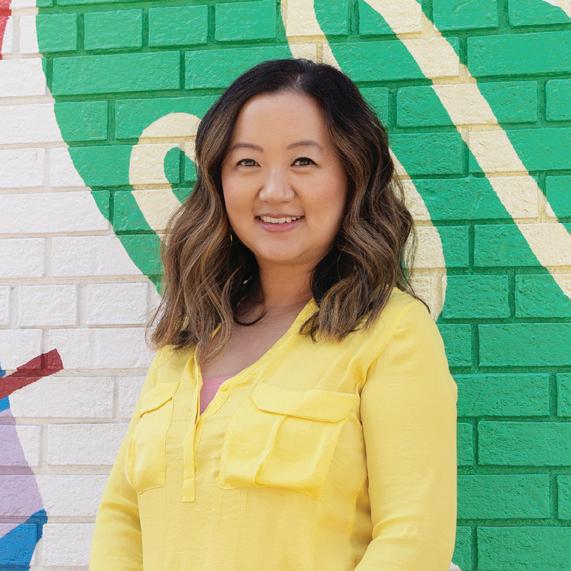
Annie Guo VanDan, President Asian Avenue magazine
Connect with us! hello@asianavemag.com @asianavemag
Join us on Sunday, August 18 at our fundraising gala for Social Fabric: Asian American Community and Cultural Center. Learn more at cacendenver.org/gala.

It is the final countdown as our capital campaign for the Social Fabric Asian American Community Center ends this month. Thank you to the many community members, local businesses, and corporate sponsors who have donated! We will be closing on the building at the end of September and begin renovations throughout the remainder of the year. With plans to open in February 2025, if you are interested in supporting this project and adding your name to the donor wall, learn more at: cacendenver.org/donate
September is Suicide Prevention Month. Thank you to Colorado Asian Culture and Education Network (CACEN)’s Program Manager Catharine McCord for sharing her personal experience with suicide and healing, as well as interviewing local behavioral health providers Dr. Ronald Lee and Liz Zhou. She provides an informative article about the cultural nuances that impact the mental wellbeing of Asian Americans and immigrants, and shares resources including hotlines and mental health programs. Join CACEN in raising awareness about suicide prevention at: (1) Out of the Darkness Walk on September 14, and (2) Burning Brightly: Suicide Prevention for Asian Americans on on September 21. RSVP at cacendenver.org.
With election season in full swing, we share a recap from Colorado Asian American delegates that attended the Democratic National Convention in Chicago last month (page 20). We also provide information about a podcast featuring Alyssa Nilemo, who is running for Colorado House District 44 (page 10).




ASIAN AVENUE TEAM
YUTAI GUO
JENEVERRE SCHULTZ
ZHAO
ZHANG
LANGEVIN
PATRICIA KAOWTHUMRONG
on the cover
During Suicide Prevention Month (September), this cover story breaks down the stigma of talking about mental health that commonly exists in AANHPI communities and families. Cover photo designed by Freepik (Freepik.com)
Asian Avenue magazine (ISSN 1932-1449) reserves all copyrights to this issue. No parts of this edition can be reproduced in any manner without written permission. The views expressed in articles are the authors’ and not necessarily those of Asian Avenue magazine
Looking to promote your business? Asian Avenue magazine offers businesses a costeffective way to reach consumers in the Denver/Boulder metro areas and beyond. For more information, call 303.937.6888 or e-mail us at hello@asianavemag.com for our media kit and ad rates. Send story ideas to hello@asianavemag.com.

19 ON SCENE: CACEN raises $30,000 for Denver’s Asian American community center, Social Fabric
20 ON SCENE: Colorado AANHPI delegates participate in the Democratic National Convention
ON SCENE: Asian youth learn more about sports during summer camps led by high school athletes
TAIWAN: Taiwan in the UN system











Saturday, Sept. 21 | Begins at 9am

Expo Park
10955 E. Exposition Ave, Aurora
Cost: $39 runsignup.com/Race/ CO/Aurora/PANDA
OCA Colorado is proud to present the fourth annual 5K Panda Run at Aurora’s Expo Park! Participants also have the option to join the Panda Promenade with is a half mile untimed walk. The Panda Run benefits youth in Asian Pacific American communities in Colorado. OCA Colorado is part of OCA- Asian Pacific American Advocates, a national nonprofit organization dedicated to advancing the social, political and economic well-being of Asian Pacific Americans (APA) in the U.S.
The famous Mr. Panda will take pictures with participants at the finish line. Medals will be awarded to the race winners in their respective categories. Snacks and drinks will be provided after the race.
East Center
Mid-Autumn Festival
Saturday, Sept. 21 | 2pm to 10pm Far East Center
Sunday, Sept. 22 | 10am to 4pm
Riverdale Regional Park
9755 Henderson Rd, Brighton Free and open to the public cdbf.org/riverdale-regional-regatta-1
Join for the Riverdale Dragon Boat Regatta at Riverdale Regional Park, next to the Adams County Fairgrounds. The daylong event will feature dragon boat races, performances, food trucks, artists, and vendors to Celebrate Colorado’s rich Asian American Native Hawaiian Pacific Islander heritage. The event is sponsored by Adams County, Colorado Dragon Boat Alliance, and Colorado Dragon Boat.

Thursday, Sept. 26 | Begins at 7pm Edgewater Public Market
Wednesdays, Thursdays, Fridays, Sundays through September 29
Four Mile Historic Park
715 S Forest St, Denver Cost: $13 to $45 fourmilepark.org/brightnights

Bright Nights transforms the Park into a captivating realm with larger-than-life sculptures illuminating the night across its 12 acres. The event features art by day and magic by night with a new theme and new sculptures each year. Come see Four Mile in a new light, illuminate your senses, and create everlasting memories. Bright Nights is in a collaboration with Tianyu Arts & Culture, Inc., the largest producer of Chinese lantern festivals in North America.
333 S. Federal Blvd , Denver bit.ly/fecmidautumnfestival24

Come and have a taste of an Asian-inspired night market and street food from all over the world. Watch your kids play with light-up lanterns, and enjoy music and entertainment from local performers. Dress them up for the kids fashion show! The festival is FREE, family-friendly in the Little Saigon Denver District.
Bring the family to enjoy a pho eating contest, moon cake eating contest, cultural performances, K-pop Dance Battle & Random Play Dance, traditional drumming, karaoke singing contest, and giveaways!
The Mid-Autumn Festival is a celebration of the harvest moon and it is a time to connect with family.
5505 W 20th Ave, Edgewater instagram.com/thedenverasianscene
Join The Denver Asian Scene for a fun and engaging social networking event to mingle, make new friends, and build meaningful connections within the Asian community. Don’t miss out on this chance to network, socialize, and be a part of a supportive community dedicated to uplifting one another.
Learn more about The Denver Asian Scene, sign up for their weekly newsletter, or submit an event, email info@ denverasianscene.com

Friday, Oct. 4 | 6pm to 9pm
Ameristar Casino Resort Spa
Summit Ballroom 5th Floor
111 Richman St., Black Hawk Cost: $100 acccolorado.org

Asian Chamber of Commerce (ACC) is invites you to their annual gala at Ameristar Casino Resort Spa in Black Hawk. This year, enjoy a Japanese-themed assortment of culinary delights! There will also be cocktails, networking, and a silent auction. ACC will provide remarks and share about the organization’s upcoming plans. Guests can receive a discounted rate for an overnight stay at Ameristar Casino Resort Spa for the evening.







Alyssa Nilemo and I have an unusual friendship. Sleep-deprived in big conference rooms at a fancy hotel in Japan, we exchanged maybe two conversations over the span of four days during the U.S.-Japan Council’s Emerging Leaders Program in 2018. We crossed paths again last year in Washington, DC.
Now, in 2024, Alyssa handwrites thank you cards to her donors while her mother, Donna Inouye, walks me through a detailed, poster-sized family tree that she had prepared for my visit. Hand-drawn lines connect Alyssa’s name to those of ancestors who immigrated from Japan to Colorado as early as 1907.
Running for office in Parker, Colo., Alyssa shares that she’s a fourth-generation Coloradan on her campaign website. She’s mixed race. Her father is of Swedish and German descent, and because only about five percent of the population in Colorado is Asian, many people assume that it’s her Caucasian side that has been in the state for generations. However, Alyssa will clarify that it’s her Japanese family who established roots here more than a century ago.
Based on her research, Donna explains that her great grandmother set-
Toshiki Nakashige produces a narrative podcast called Middleweight that explores the shared interests, identities, and histories at the center of human relationships. This season, District 44, documents Alyssa Nilemo’s run to become the only elected official of Asian descent in Colorado state government.
tled in Eaton, where she had a daughter named Florence, Donna’s maternal grandmother.
Since it’s Alyssa’s great great grandmother who immigrated to the US, I ask whether Alyssa could technically be considered fifth-generation. Factors, including Florence having spent seven years in Japan during childhood and herself marrying a Japanese immigrant, complicate how family members count generations.
Moreover, it was Donna’s father (Alyssa’s grandfather), Herb Inouye, a proud second-generation Japanese American who became the hero of the family and effectively defined the generations.
“Basically, over the years, this has become Grandpa’s story,” Donna says.
Growing up in Jefferson County, Alyssa spent virtually every weekend in the city at the Denver Buddhist Temple, where Grandpa Herb was a community fixture.
Story after story, Donna reflects on how he exuded kindness toward others, especially if they were from a different background.
Herb was 13 years old during World War II when his family evacuated California for Colorado where they could live as free citizens thanks to Governor
Ralph Carr. Recognizing the importance of paying attention to people who may feel like they don’t belong, Herb fought injustice in all facets of his life until his death in 2015.
Alyssa now lives in Parker and is running for the Colorado House of Representatives in House District 44. When she talks to voters, she recounts her grandpa’s story in which he and his family approached the National Guard at the Colorado state border: “My grandfather remembers them saying, ‘Welcome to the State of Colorado. Welcome to your home.’ And so for my family, that became what Colorado was to us.”
The Alyssa4Colorado campaign slogan is “People Before Politics.” She doesn’t sacrifice civility at the expense of communicating her positions on inclusive education and housing opportunities. In a hyper-partisan era of national politics, she strives to bring nuanced discussion and respectful debate into local government.
Alyssa is running for the HD44 seat as a Democratic candidate, but she’s also happy to acknowledge that it was a Republican governor who provided a new home for her family.
In our brief interactions when we first
met six years ago, I witnessed a glimpse of her style of leadership: a measured pragmatism whose edges are softened by kindness.
Although we only had a handful of interactions before meeting again in DC, I knew enough about her to be intrigued by what she could do as a candidate and wanted to understand where her perspective came from. I asked if I could come to Colorado to create a podcast about her experience in the runup to the November election.
She granted me access to her campaign, and I’m now producing a 12part audio series called Middleweight: District 44 and releasing episodes throughout this year’s election season. Participating in campaign activities and attending events hosted by lead-
ers in the Denver-area Asian American community, I’m quickly learning that it was Grandpa Herb’s faith in humanity that shaped her worldview.
Alyssa and I have a unique friendship because the only thing we knew about one another when we met was our respective family trauma. But since arriving in Colorado, I’m getting to know Alyssa in the way you would a mutual friend you just met at a dinner party.
We sit in her living room after she shows me the peppers she’s growing in her garden. I drink tea from a mug printed with a colorful photo of her husband posing on a motorcycle. She tells me about her hobbies, at least the ones she enjoyed before she began spending all hours outside of her day job running a political campaign.
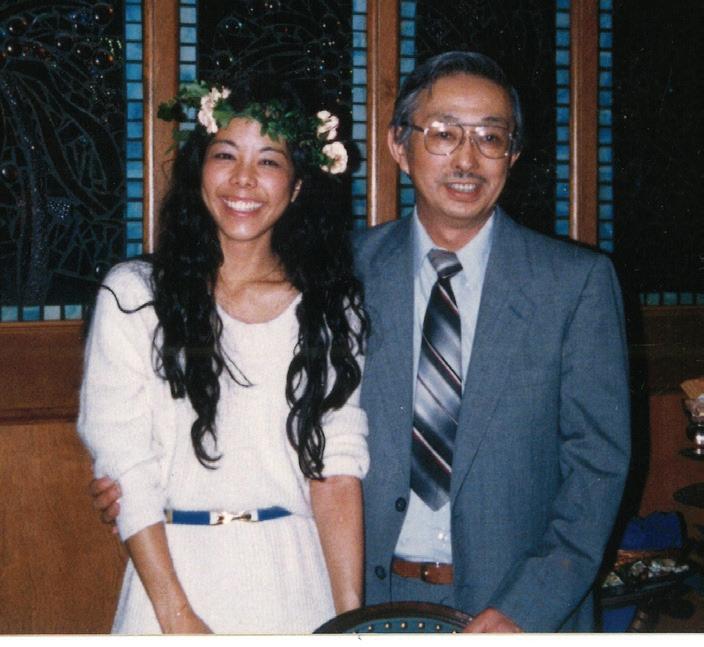
I also ask Alyssa what kindness means to her. It’s a word that comes up in her political TikTok videos, and it’s a principle that Herb Inouye embodied.
She takes a deep breath. “I just think there’s a generosity of wanting to give time to people—of understanding that people come from different places— and those experiences change people.”
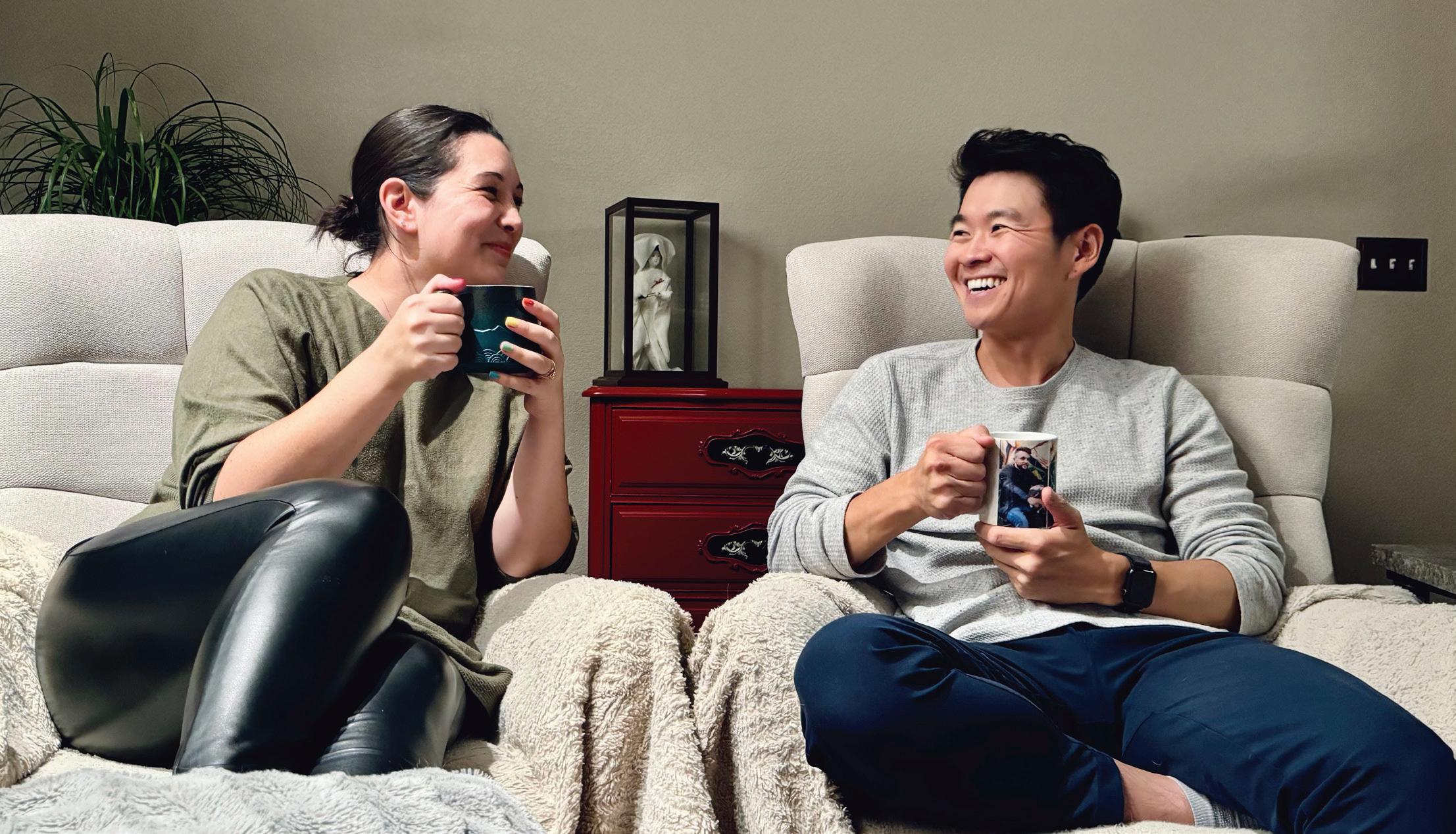

Toshiki Nakashige @toshnaka
Designed by Freepik

Written and compiled by: Catharine McCord
This article contains discussions and references to suicide, which may be triggering for some readers. Please proceed with caution. If you or someone you know is experiencing suicidal thoughts, support is available. Reach out to a mental health professional or contact a suicide prevention helpline immediately.
As Suicide Prevention Month approaches, I find myself reflecting on a deeply personal journey that began 32 years ago when I lost my father to suicide. At the age of eight, this loss profoundly shaped my understanding of mental health, grief, and resilience. Today, I share my story to raise awareness and advocate for the importance of mental health support, especially within our communities.
While acknowledging the impact of my father’s death, I also emphasize the significance of the healing process for my family and me as survivors of suicide. This journey is ongoing, complex, and deeply personal, as we navigate the layers of grief and the enduring effects that suicide leaves on loved ones. It’s a path that requires acknowledging our own pain, seeking support, and building resilience, not just within ourselves, but in our communities as well.
Through this article, I hope to shed light on the unique challenges faced by Asian American, Native Hawaiian, and Pacific Islander (AANHPI) communities regarding mental health and suicide prevention. To enrich this discussion, I had the privilege of interviewing two esteemed mental health professionals who are making significant strides in this field: Dr. Ronald Lee, an American-born Chinese psychologist in Denver, and Liz Zhou, a compassionate therapist specializing in neurodivergent adults and couples. Their insights, combined with my own experience, underscore the importance of culturally sensitive approaches to mental health within our community.
In my conversations with Dr. Lee and Dr. Zhou, we explored the unique mental health challenges faced by AANHPI communities, the cultural factors influencing perceptions of mental health, and the importance of integrating traditional practices with modern therapeutic approaches.
Their insights provide valuable guidance for both individuals and families navigating these complex issues. Dr. Lee shared that in researching the patterns of AANHPI communities and mental health, he learned that Asian Americans in the U.S. were the racial group least likely to access mental health support when they were in distress.

Catharine McCord is a proud Taiwanese American with expertise in science, community development, and holistic wellness. She is the Program Manager for Colorado Asian Culture and Education Network (CACEN) and Program Coordinator for Colorado Asian Pacific United (CAPU).
Catharine is dedicated to supporting veterans through her role as an educator and mindfulness guide for Veterans to Farmers. Her holistic approach to wellness empowers veterans as they transition to civilian life. Catharine’s commitment to uplifting underserved communities is reflected in her diverse roles and educational background, emphasizing community empowerment and cultural preservation.
“The Model Minority Myth assumes that we don’t struggle or that we are naturally able to excel at things without needing much help,” said Dr. Zhou.
“The myth can mask the challenges that our communities face, and of course, it’s a myth – it’s not representative of everyone in the community.”
Dr. Lee continues: “It increases pressure on students and professionals to live up to an unrealistic level of expectations to achieve and be an example to others. It is also devastating when an AANHPI person inevitably fails to meet those high expectations.”
“This situation sets up conflicts with Black and Brown communities, which increases interracial stress.”
“Currently, AANHPI communities are experiencing anti-Asian hate and violence at an all-time high. The fear of being the victim of violence in public places is very much on the minds of the AANHPI communities, particularly women and older adults. The data backs up this fear as statistically legitimate,” said Dr. Lee.
According to Dr. Lee, “AANHPIs often feel underappreciated, undervalued, and sometimes ignored when it comes to achievement or acknowledgment.”
“In many AANHPI communities, mental health is a highly stigmatized topic,” said Dr. Zhou.
“It can be seen as a sign of weakness to ask for support or to struggle with emotions. When a topic is taboo, it can drive people to hide their struggles or to suffer in silence.”
How do cultural factors influence the way mental health issues are perceived and addressed within AANHPI communities?
I want to recognize that exact cultural factors will vary depending on the community and other intersectional identities since, of course, we’re not a monolith. But I have noticed a general theme of coming from an immigrant family – being first-gen, 1.5 gen, second-gen, or beyond – and struggling to bridge the gap across generations. The places that our parents or ancestors immigrated from may have a completely different approach to mental health, if it’s even talked about at all.
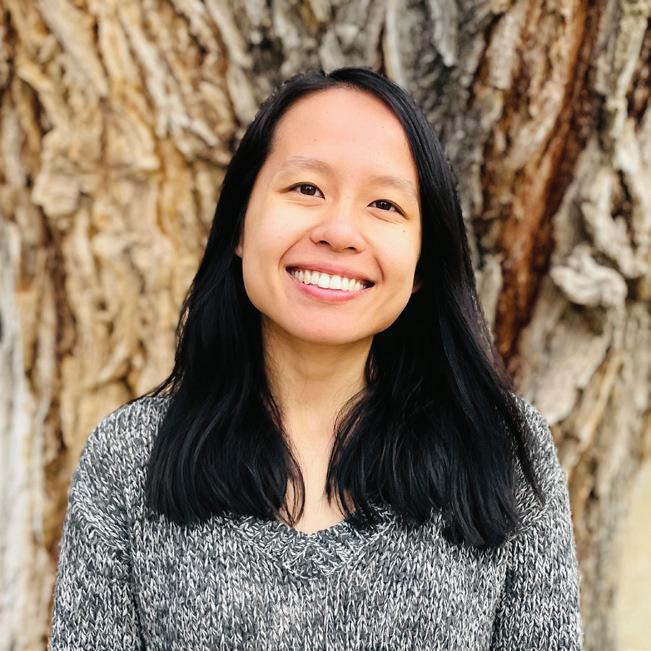
There can be an incongruence between the beliefs of one generation and the beliefs of the next generation.
How can families and communities be involved in supporting individuals struggling with suicidal thoughts within the AANHPI community?
Within our communities, I think it’s really important to have more open conversations about mental health and to normalize the fact that we all struggle at times. Maintaining mental health can be a real challenge during these difficult global times.
For individuals struggling with suicidal thoughts, it can make a huge difference to know that mental health is in people’s awareness and that it’s even a topic on the table. When we start talking about these experiences more, the misunderstanding, confusion, and shame around them can start to dissipate, and we can really empower and support each other from within our community.

There can be an incongruence between the beliefs of one generation and the beliefs of the next generation.
Designed by Freepik

Can you share culturally sensitive approaches you use in therapy to address suicide prevention?
Because there exists a stigma of mental health for the AANHPI community, there needs to be lots of education and promotion of mental health resources. Communities need to know that local and national support lines for suicide have access to translators who can speak different AANHPI dialects.
Since AANHPI do not typically talk about therapy as normal in their family and social conversations, there needs to be outreach about suicide prevention to areas that are more populated by AANHPI families, including faith-based and other AANHPI community leaders. The language of this educational information needs to be culturally sensitive and representative of how local communities speak (including language translation if needed).
Once a person is in therapy to address suicide, there needs to be a careful examination of the person’s history. The therapist will look for themes of isolation, depression, feeling unworthy, or like they don’t belong. Since it is hard for many AANHPI to be forthcoming about these themes, more concrete questions like their sleep habits, appetite, socialization, and family relations will more effectively get to these themes.
It is important to reach out to the person’s family or social network to share in the concern for suicide and to be willing to mobilize supportive resources for professional mental health sup-
port if there is a need. These supportive people need to be coached in giving praise for the individual to work on their concerns through therapy, as opposed to shaming them for not living up to expectations. The inclusion of language translators may be appropriate to more fully communicate concerns and the importance of safety planning.
How do you integrate traditional and modern therapeutic practices to support your AANHPI clients?
The encouragement of maintaining or increasing traditional practices to support AANHPI clients, like mobilizing the support of family and religious faith, as well as connecting with one’s heritage and community, should be mixed in with more modern practices of considering medications, trying talk therapy, and practicing mindfulness (meditation and yoga). In many ways, these naturally overlap.
Therapy is often a good way to supplement a lack of social support or family. Research-based medications can often go hand in hand with herbal or dietary treatments. And many see an overlap in the powers of prayer and religious practices with mindfulness, yoga, and stress management.
What strategies do you find effective in building trust with AANHPI clients who may be hesitant to seek help due to stigma?
Re-norming the AANHPI community so that mental health support is common and normal practice rather than taboo and a last resort is crucial. Contrary to popular belief, research shows that talking about suicide does not increase the risk for suicide. It actually decreas-
es it. As a community, we just have to get past the stigma of talking about it publicly. This social re-norming is done through repetitive exposure and education about mental health support.
Education should include talking about common stressors that challenge the myths in AANHPI communities, like the beliefs that all AANHPI are rich, educated, and live in nice homes. There is a false belief that AANHPI communities economically and socially have it easy. Showing how different AANHPI nationalities within the community are struggling in ways that defy the myth of the “Model Minority” is key.
Convincing AANHPI community leaders that mental health support is not a threat to their culture and traditions is very important. That way, the voices of these leaders at community centers and places of worship will be more in partnership and collaboration, rather than challenging the traditional ways and the power of communities.
If mental health agencies or other service systems (like social services, law enforcement, the justice system, and schools) have caused bias or injury to the AANHPI community in the past, they need to publicly own that and seek to repair the damage for those errors in partnership with community leaders.
Finally, there needs to be more racial representation by hiring more AANHPI therapists. In spite of the growth of the AANHPI citizens in Colorado, there remains only a handful of AANHPI therapists in the mental health profession. Potential clients will feel more welcomed and understood in mental health settings if they have more therapists who look like them and have culturally walked in their shoes.
What advice would you give to an AANHPI person who is struggling with suicidal thoughts?
Dr. Lee: I would make sure that they are talking to their loved ones about their struggles, advise them (with resources) to consider professional mental health support, have 24/7 crisis lines handy for emergencies, and emphasize that they are not alone. In my experience, suicide lives in people for an intense but brief period of time.
For this reason, I try to help folks understand that if they can get through this crisis point of suicide in a healthy way with the close support of others, there will soon be hope and opportunity on the other side of it.
I also stress to people who lost someone due to suicide that taking one’s own life is the result of many complex factors converging at the same time.
No one person or situation is to blame for another person’s suicide.
Not being alone in this mess is very important. There are very few folks who are suicidal and also feel like their life is worthwhile and that they belong to others.
Helping individuals in distress succeed with these goals is what energizes me the most.
Dr. Zhou: My first advice would be to name and acknowledge their experience. Things can feel particularly painful when we feel like we have to bottle things up.
Your mental health journey may start with journaling about your thoughts and feelings. That way, you’re not car-
Reflecting on Dr. Lee and Dr. Zhou’s responses, I am reminded of the complexities my own family faced after my father’s passing. Their emphasis on cultural sensitivity and community support resonates deeply with me, as I recognize how much we needed those very elements during our time of grief. Additionally, I am struck by how much our community needs to break the silence surrounding mental health. My father’s struggle was not just his alone, but a reflection of the unspoken pain many endure. It is crucial that we begin to see mental health not as a taboo, but as a vital part of our well-being, deserving of care and attention.
As we observe Suicide Prevention Month, it is crucial to recognize that mental health is a shared responsibility within our community. The conversations I had with Dr. Lee and Dr. Zhou highlight the need for culturally attuned
Designed by Freepik
rying the pain in your own mind, but it can exist on a piece of paper outside of you.
Next, you could progress to sharing your experiences with a trusted loved one – someone who you know can hold space for you and will be compassionate and non-judgmental.
Equally as valuable as having a personal support network is finding professional support – whether that’s individual therapy, group therapy, or simply a support group in the area.
Know that you don’t have to handle all of this by yourself, and that there are people who are professionally trained who want to support you and who can teach you the skills to take really good care of yourself.

approaches that honor the unique experiences and challenges of AANHPI individuals. From addressing the stigma surrounding mental health to promoting accessible resources, we all have a role to play in creating a supportive environment.
If you or someone you know is struggling, know that help is available, please reach out to a mental health professional or a trusted community resource. You are not alone, and help is available.
The journey through mental health challenges can be daunting, but it is one that no one has to walk alone. Below are resources that offer support and understanding, ensuring that no one in our community feels invisible or unheard. Together, let’s work towards a future where mental health is openly discussed, and every individual is valued and supported.

National Suicide Prevention Lifeline: 1-800-273-TALK (8255)
988 Suicide & Crisis Lifeline: Dialing
988 (national number routed to local agencies) or texting 38255 (Colorado based) will give you 24/7/365 mental health support by professionals who will give you access to immediate, live, translatable (in several languages) crisis support

Asian Mental Health Collective: asianmhc.org
National program that “aspires to make mental health more available to Asian Communities worldwide.” They have a directory that enables you to find local contacts and information for reputable Asian therapists. They also have the Lotus Therapy Fund, which provides free therapy sessions for AANHPI individuals in need.
Aurora Mental Health & Recovery
Cultural Development & Wellness Center: auroramhr.org/cultural-developmentwellness-center/behavioral-health
Formerly the Asian Pacific Development Center, this agency provides culturally sensitive behavioral healthcare services to local immigrant and refugees with the support of multi-lingual therapists and counselors
Colorado AANHPI Mental Health
Providers Directory: cacendenver.org/mental-health
Explore the directory to find AANHPI providers in Colorado, their areas of focus, and contact information

LGBT National Youth Talkline: 1-800-246-7743
Project Extreme:
Text LEV to 741741 to get connected to an anonymous crisis counselor Second Wind Fund (Colorado): thesecondwindfund.org


Free therapy service for youth in Colorado who are at risk for suicide

Trans Lifeline: 877-565-8860
Trevor Project: 866-488-7386 (24/7) or Live Chat

Colorado Crisis and Support Line: 1-844-493-TALK (8255)
Mental health professionals available 24 hours a day
As a Mental Health Community Ambassador with Metro Denver Partnership for Health, Colorado Asian Culture and Education Network is offering two events centering AANHPI Suicide Prevention:
On September 14, CACEN will organize a team at the American Foundation for Suicide Prevention’s Out of the Darkness Walk. Walk with us to show your support for mental health awareness, healing, and resilience in our communities.
If you’ve been impacted by mental health struggles or touched by the loss of a loved one, we invite you to join us. We recognize that it can be difficult to confront these experiences, but being in community with others can be healing. Let’s work towards a future where mental health is openly discussed and valued.
On September 21, Dr. Lee will present “Burning Brightly: Suicide Prevention for Asian Americans.” There’s a Chinese proverb that says, “only when everyone contributes wood will the fire burn brightly.” This is the case for individuals struggling with suicide. Social isolation coupled with feeling a lack of belongingness to family and friends are two factors that are highly associated with suicide. For Asian Americans, suicide is the second leading cause of death for children and young adults.
This workshop will explore the factors that increase the chances for Asian American suicide, and the proactive measures that communities can take to lessen the risk. Drawing from his background as a clinical and school psychologist, Dr. Lee will walk participants through the latest research, AANHPI cultural considerations, and expert discussions on suicide prevention. Learn more at cacendenver.org or connect on social @cacendenver.
Veterans Crisis Line: 1-800-273-8255 (24/7) or Live Chat (24/7)



Asian Avenue: What was the inspiration behind writing this story?
Maclear: Gracey [Zhang] and I worked on The Big Bathhouse together and I wanted to work with her again to recreate a sensory and immersive experience of the bicycle food delivery guys and their acrobatic skill. I wanted to capture the history, magic, and circus of it all without being nostalgic. Rather, I wanted to present it in the moment and dynamically.
Who is your target audience for this picture book?
By Jessalyn Herreria Langevin
As a read aloud, children as young as four years old can enjoy it but I also think children as old as seven years old would enjoy it. Noodles on a Bicycle appeals to anyone who wants to gain a sense of city life or someone who loves the hustle and bustle. It also depicts family life and tells the story from a child’s point of view. Gracey is great at capturing childhood.
What was the largest stack of trays you have seen the demae, bicycle food deliverers, carry?
The most I saw was five tiers but by the time I saw them, they were starting to go out of style. I never saw anything like the pictures in the book.
Noodles on a Bicycle celebrates noodles which are huge in Asian culture. A few years ago, my mother was diag-

nosed with dementia and bringing her a bowl of soba is a joyful experience. The bond created with food is strong.
What is your favorite type of noodle?
I like all noodles; I like soba and udon but also pasta. We see a lot more ramen in the US and I hope we see more soba noodles.
What future projects do you have in the works?
In October, I have a story with Enchanted Lion titled There’s a Ghost in the Garden. I have another project with Julie Morstad that was just announced. Also, there’s The Inactivity Book with Random House.
What advice do you have for young readers?
Read widely - leave your lane. Maybe jump the fence. Try other genres with things that pique your interest. Also, always have a book on hand.
Noodles on a Bicycle is on sale now! Enjoy this historical picture book and its vibrant glimpse into Japanese culture.
Jessalyn Herreria Langevin has been an avid reader since longer than she can remember. Follow her Bookstagram for romance, fantasy, and other assorted reading recommendations @beautyandthebookdragon
Before cell phones, apps, and online ordering, Japan received its take-out orders by way of “demae” or bicycle food deliverers.
Noodles on a Bicycle, written by Kyo Maclear and illustrated by Gracey Zhang, tells the everyday story of these bicycle food deliverers of the 1970s.
Available on Amazon - $18.99


Meta Sarmiento sells out his concert at The Savoy Denver, a rare occurrence in the city for local independent artists, but he didn’t do it alone. Featuring the Padayon Cultural Dancers, Meta blended culture and community while launching his newest project: Jungle Rules & Other Poems, a Lyrical Lookbook. He also had support from his opening lineup in Monica the Great, Jaiel, and ALPHV.
From the back to the front of the room, attendees laughed, got tearyeyed, and bounced as Meta took his audience through a spectrum of emotions, sharing his music, stories, and poetry that chronicled the many events that shaped him through his life, on his journey as a Filipino-American growing up in Guam and now living in Aurora, Colo.
His performance opened with a modern twist on the Tinikling, a traditional folk dance from the Philippines in which dancers mimic the Tikling bird

and then transitioned into a display of Arnis, a traditional Filipino martial art that involves striking with hardened bamboo sticks.
Meta then continued the night performing favorites from his album Jungle Rules and other songs like Follow You, Good I Have, and Fake Friends. The crowd was energetic the whole way through, screaming lyrics, singing along, and dancing to the beats of the music.
Meta’s performance ended with his iconic song Love & Money and featured the Binusuan, another folk dance from the Philippines where two dancers moved, dipped, and spun all with glasses of wine resting on their open palms and atop their heads.
Meta was able to weave the traditional and modern, the jungle and the street, the individual and the community, in ways that most artists might only wish to.
Follow Meta Sarmiento’s journey on

his Instagram @metasarmiento or stay in touch via his website at www. reachmeta.com.

Jungle Rules & Other Poems combines the lyrics and poetry of Meta Sarmiento with the photographs of Olivia Jones to create a collection of work that captures the fires that raised a little island kid.
65-page paperback book
Publication Date: Feb 6, 2024
Author: Meta Sarmiento Photographer: Olivia Jones


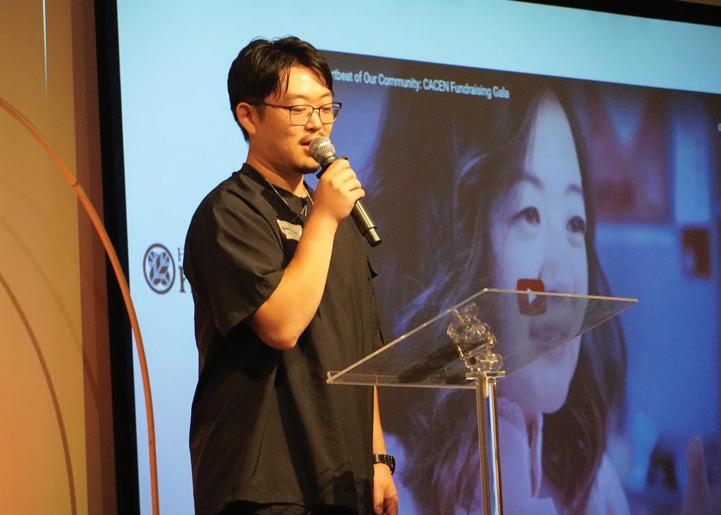



$30,000
On August 18, Colorado Asian Culture and Education Network (CACEN) friends and supporters gathered to learn about the Social Fabric Asian American Community Center.
With the support of sponsors and community members, the event raised $30,062 for the new space. Guests enjoyed performances from pianist Natalie Ouyang, guitarist Kenny Lee Young, and Nepalese dancer Sabita Shrestha.
Lynda Saignaphone, CACEN boardmember, opened the evening by welcoming guests to the fundraiser.
Guests enjoyed appetizers and drinks, while taking photos in front of a flower and balloon wall. They visited
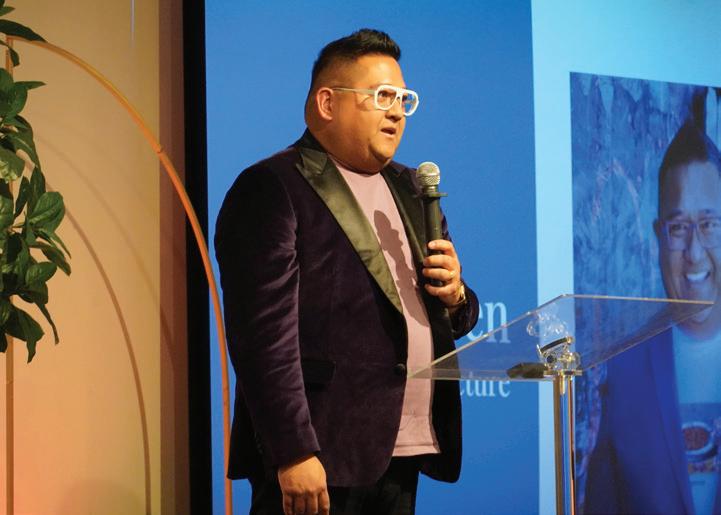
a display that featured the stories of Asian American Hero of Colorado Award recipients who have passed away.
Kevin Nguyen of Regular Architecture presented designs for the new center including co-working spaces, a cafe and library, and private offices. Plans are to begin renovations in October of this year, so the space can open in February 2025.
Bruce Tetsuya of House of Kodō shared a video about CACEN’s 15 years of service and ways to get involved in the community center.
Annie Guo VanDan, Executive Director of CACEN, shared that the community center’s name implies that Asian Americans are a part of the “social
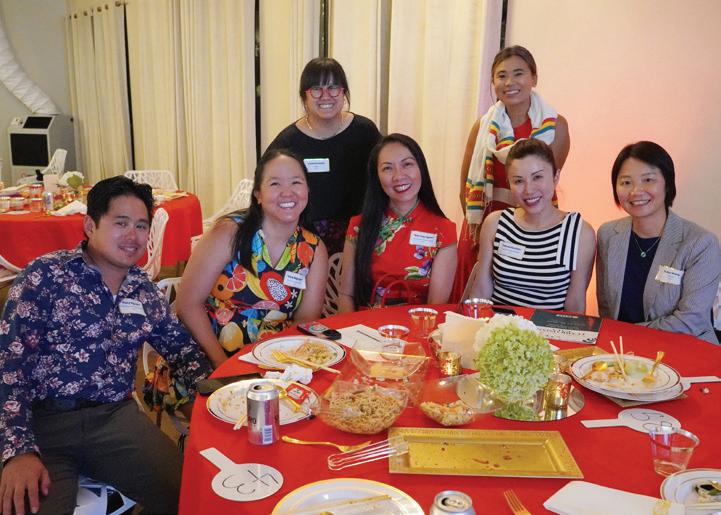
fabric” of Colorado communities, yet are often unseen. The goal of the community center is to provide a place of belonging and pride for AANHPIs, especially for younger generations and families.
With the community’s support, the 7,200 square foot building will provide event space for local organizations and house AANHPI businesses and health providers.
Volunteers including students from Asian American Youth Athletic Association assisted in serving food catered from Sushi Kazu and Hoong’s Palace.
To learn more or to donate, follow @cacendenver or visit CACEN’s website cacendenver.org.

The quadrennial meeting of the Democratic Party made history by nominating the first Black and South Asian woman presidential nominee.
By Howard Chou, Colorado Democratic National Committee Member
Every four years people from the two major political parties in the US attend their party’s convention and nominate their candidate for president.
This year, I was fortunate enough to be elected both delegate to the convention and member of the Democratic National Committee (DNC). Thus, I was able to go to Chicago and partake in the festivities of the DNC convention and witness a most historical experience.
Earlier this year, I could have never imagined being a part of such an event that could shape our country and shatter the highest of glass ceilings. But what was equally amazing was the lineup from convention, which included like Michelle Obama, Oprah, Stevie Wonder, P!nk, John Legend and Democratic leaders like Barack Obama, Corey Booker, Pete Buttigieg, Tammy Duckworth, Alexandria Ocasio-Cortez, Grace Meng, and Tim Walz.
Colorado’s AANHPI delegation was present to nominate the first Black and Asian woman, Kamala Harris, to the highest office in our land; an unprecedented honor could not be compared.
In Colorado, a state where only five percent of the population is Asian, we more than doubled that percentage in Asian American delegates and nine of us came out to make an impact on the political spectrum and fight for more

AANHPI representation. When President Biden withdrew from the presidential race, the convention became a history-making event that none of us could have ever dreamed of.
People at home got to see the convention nights at the United Center, but during the day were Caucus (AAPI, Black, Hispanic, Women’s, LGBTQ+, etc.) and Council (Energy and Climate Crisis, Labor, Youth, etc.) meetings, where Democrats gathered to engage and hear speakers talk about the challenges within each Caucus and Council.
Not to mention many other events and luncheons were held, especially within the AANHPI community. The Taiwanese Embassy hosted lunch featuring US Representative Ted Lieu in the Willis Tower with spectacular views of Chicago from the 67th floor.
APIAVote, a national civic engagement organization, organized a luncheon of nationwide AANHPI leaders and elected officials who coalesced their influence and support for Kamala.
During another luncheon, the Illinois Asian Caucus shared the success of their redistricting efforts that elevated AANHPI representation in districts that could concentrate their voices and not dilute them between multiple districts. This allowed for AANHPI champions to be elected across the board from mu-

nicipal to state legislative to county commissioners in Chicago and beyond.
The four-night convention conducted Democratic Party business including spectacular roll calls, videos detailing important issues and the defense of democracy, and performances from music icons. All-star Democratic leaders, actors, an NBA Champion coach, the Central Park 5 and even longtime Republican stalwarts took the stage.
Among them were Asian American leaders, elected officials and celebrities like Andy Kim, Ted Lieu, Tammy Duckworth, my mentor Grace Meng, Mindy Kaling, Maya Harris and our Presidential nominee, Kamala Harris.
In an arena of greater than 20,000 attendees, when some of them spoke, it often felt like they were speaking directly to me. I got chills and a renewed sense of hope and pride and felt injected with invigorating enthusiasm.
The last night was culminated by the presence, leadership, compassion and dedication of an undeterred champion and her journey from a working class family in Oakland and Berkeley to becoming the next President of the United States. Kamala Harris is the American dream—a dream that I thought unfathomable in my lifetime that became a possibility and a reality so pleasantly achievable.

In April 2024, Colorado Democratic Party elected seven AANHPI delegates to go to the Democratic National Convention in Chicago.
Along with the two automatic delegates, a total of nine AANHPI members made up Colorado’s delegation to the DNC in August 2024.
Indira Duggirala, First Vice Chair of Colorado Democrat said: “The delegates had a very busy four days. We attended various caucus meetings and receptions organized by national and local AANHPI organizations.”
“It was an unique opportunity to network with AANHPI Democrats across the country and hear from national AANHPI leaders directly. The evenings were spent in Convention activities.”



Colorado AANHPI
DNC Delegates
Howard Chou
Lucy Hojo Denson
Indira Duggirala
Indira Gujral
Kevin Leung
Radhika Nath
Kenny Nguyen
Sally Taylor
Serena Thomas
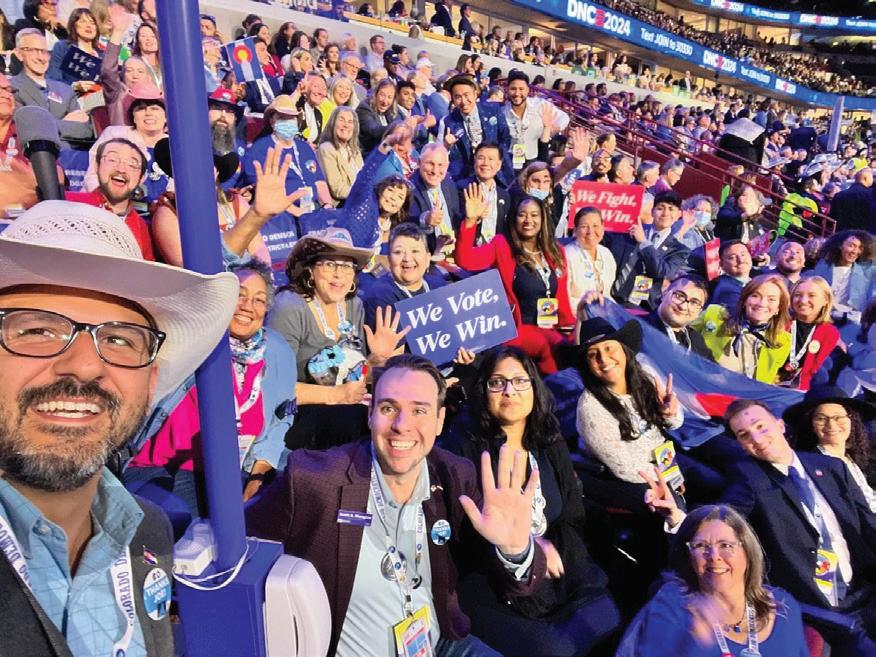





















Established in the summer of 2023, the Asian American Youth Athletic Association (AAYAA), has wrapped up another successful season of youth sports camps. Founded by Brock Benson (19), Eddie Chen (17), Cooper Huang (17), and Bellina Huang (15), AAYAA was created to encourage sports participation within the Asian community.
The camps welcomed Asian American children aged 5-13 from diverse backgrounds, to get a taste of the vibrant sports environment through introductory basketball, soccer, and ice skating drills.
AAYAA camps not only promote athletic engagement but also enhance mental well-being. Many children arrived hesitant to speak but grew confident and outgoing by the end of the

By Eddie Chen
summer, often sharing jokes with the coaches. Over 30 high school volunteers played a crucial role, running drills and interacting with the kids, demonstrating that they too could become star athletes. This experience also proved highly positive for the volunteers, who developed leadership skills and a strong sense of community.
With the support of the Colorado Asian Culture and Education Network, AAYAA was able to offer 12 hours of engagement for $45 (half the cost), which helped to remove some financial barriers to participation.
Throughout 2023 and 2024, AAYAA made a meaningful impact on approximately 200 kids. Feedback from participants and parents was overwhelmingly positive, with one parent noting,


“[Camper] really enjoyed the camp and thanked us for sending him to AAYAA. Please let the coaches know how valuable their time, energy, and care impacted [camper’s] experience.”
In 2024, AAYAA extended its reach beyond Colorado. The executive team, which consists of Eddie Chen, Cooper Huang, Jane Douglass, and Zoey Hao, hosted a successful camp in Oklahoma City in combination with local high school athletes. Here, feedback was equally enthusiastic, as both parents and kids are eager for AAYAA’s return next year.
Concluding the 2024 camps, AAYAA is excited to return next summer, continuing to inspire the next generation of Asian American athletes!


Taiwan is an indispensable partner in global supply chains, producing more than 90 percent of the world’s highend semiconductors and a significant portion of the advanced chips that are driving the AI revolution. Moreover, half of the world’s seaborne trade passes through the Taiwan Strait, making it a key international waterway. Yet even though large parts of the world—and billions of people—have enjoyed great prosperity thanks to the peace and stability that prevails across the strait, China continues to intensify its aggressive actions against Taiwan. Beijing’s attempts to change the status quo across the Taiwan Strait and expand authoritarianism throughout the Indo-Pacific region are a profound threat to peace and security all around the world.
In recent years, global leaders have used both bilateral and multilateral occasions—including G7, EU, NATO, and ASEAN meetings—to highlight the importance of maintaining peace and stability across the Taiwan Strait.
However, despite being aware of the importance of reducing tensions in the region, the United Nations (UN) has yet to take action to address the challenges posed by the PRC or to incorporate Taiwan in the UN system. As new approaches to engaging with Taiwan have emerged in the global community, yielding huge global benefits, the idea that there must be a choice between the PRC and Taiwan in the UN system is a false dichotomy. Now is the right time for the UN to evolve and to rethink its unjustified policies that exclude Taiwan.
The first and most urgent task that the UN must address is to stop succumbing to the PRC’s pressure and refrains from distorting UN General Assembly (UNGA) Resolution 2758 adopted in 1971 any further. By willfully misrepresenting Resolution 2758 and falsely conflating it with its own “one China principle,” which
differs from the “one China policy” adopted by many countries, the PRC has relentlessly suppressed Taiwan’s legitimate right to meaningfully participate in the UN and its specialized agencies.
This misrepresentation has far-reaching consequences beyond denying Taiwanese citizens and journalists access to UN premises and preventing them from visiting, attending meetings, and engaging in news gathering. Beijing’s tactic of weaponizing Resolution 2758 to spread the fallacy that Taiwan is part of the PRC is one of the key elements in a wider campaign to establish the legal basis for justifying a future armed invasion of Taiwan. In fact, the resolution has nothing to do with Taiwan.
This case is illustrative of the PRC’s growing assertiveness in imposing its will on the international stage. And if left unchallenged and uncorrected, Beijing’s false claims will not only alter the status quo across the Taiwan Strait but also jeopardize peace and stability in the Indo-Pacific and threaten the rules-based international order.
Thankfully, in recent months, several senior US officials have criticized the PRC’s distortion of Resolution 2758 to justify its spurious claim over Taiwan.
The PRC’s expansionism will not stop at Taiwan. Recent regulations introduced by the China Coast Guard are part of a broader gray-zone tactic designed to reinforce the PRC’s specious territorial claims and expand its influence. By introducing rules that justify the boarding and detaining of vessels and allow individuals to enter disputed maritime areas, Beijing aims to assert control over international waters and challenge global norms and claims.
To ensure global peace and economic stability, the UN and the international community must not only reaffirm their concerns about Beijing’s coercive behavior but also work together to prevent
its unlawful schemes.
As the world’s foremost forum for international cooperation, the UN system is ideally positioned to address regional security challenges and support global economic stability. The upcoming 79th UNGA and its Summit of the Future present a timely opportunity to address key security concerns while advancing the broader goals of global sustainable development and building a more resilient global community for current and future generations.
Over many decades, Taiwan has proven to be a responsible and reliable partner to those it has worked with. More recently, we have also made significant contributions to the UN’s Sustainable Development Goals. Embracing Taiwan’s meaningful participation in the UN system would undoubtedly be the UN’s best option for mitigating any potential regional crisis, maintaining peace and stability across the Taiwan Strait, and spurring global prosperity.
Looking ahead, Taiwan will continue to play its part. Working with like-minded countries to maintain healthy and resilient global supply chains— particularly in the semiconductor industry—Taiwan is determined to help power the world forward for many more decades to come.
For a more secure and better world, the UN system needs to include Taiwan.

Minister Lin Chia-Lung Ministry of Foreign Affairs ROC (Taiwan)
FUNDRAISER AND CAPITAL CAMPAIGN
Help CACEN develop the Social Fabric Asian American community center! Your support will go towards purchasing the building, architectural costs, renovations, equipment, and furniture to create a place of belonging for Denver’s Asian American community.
Online Donations
Fundraisers
Sponsorship Opportunities
The Community Center will feature:
Co-working and meeting space
Private offices for AANHPI nonprofits and businesses

AANHPI health/wellness providers and therapists
Incubator for entrepreneurs
Event space
Library highlighting AANHPI authors
Family friendly kids play area




Designs by Regular Architecture